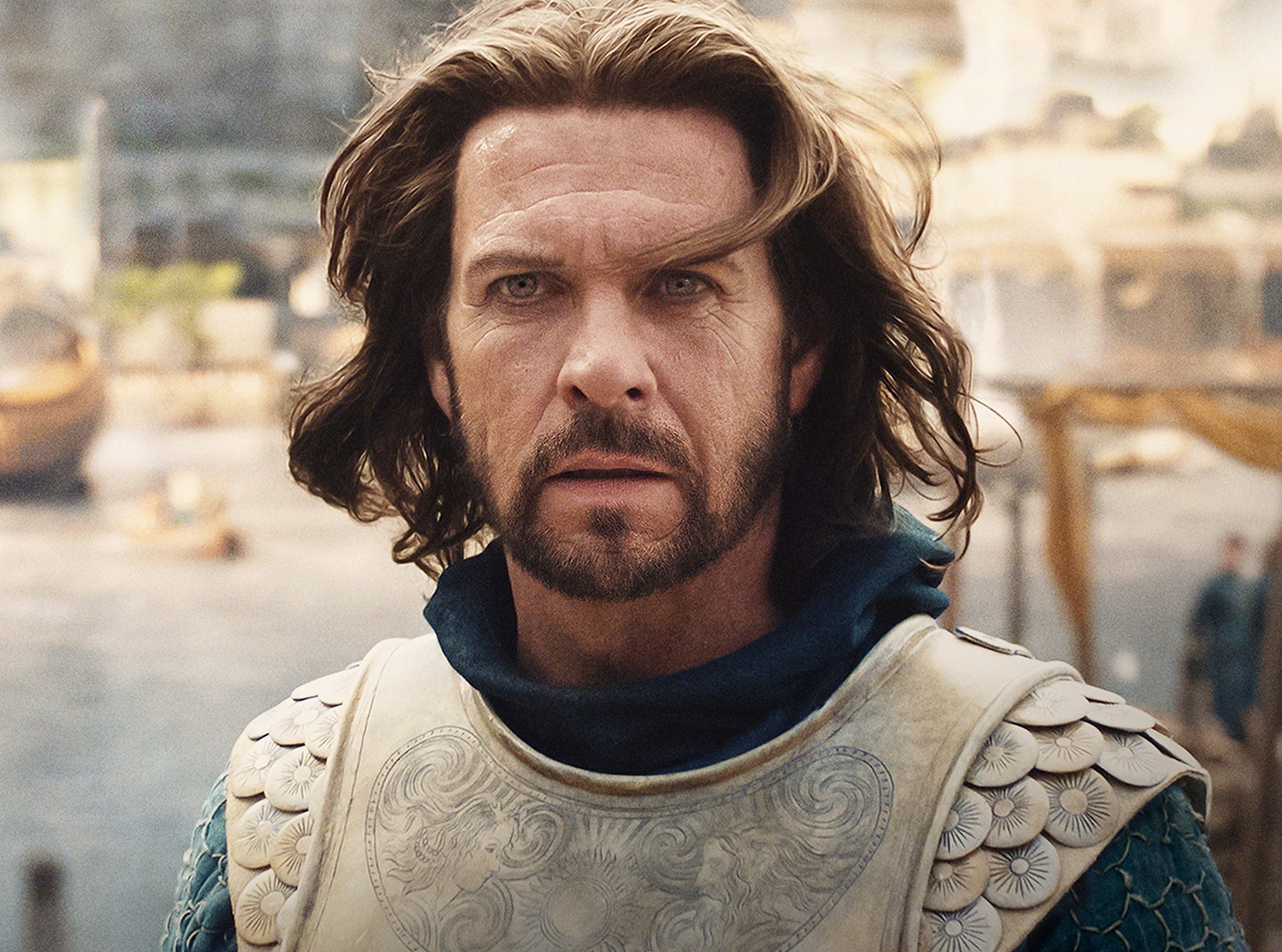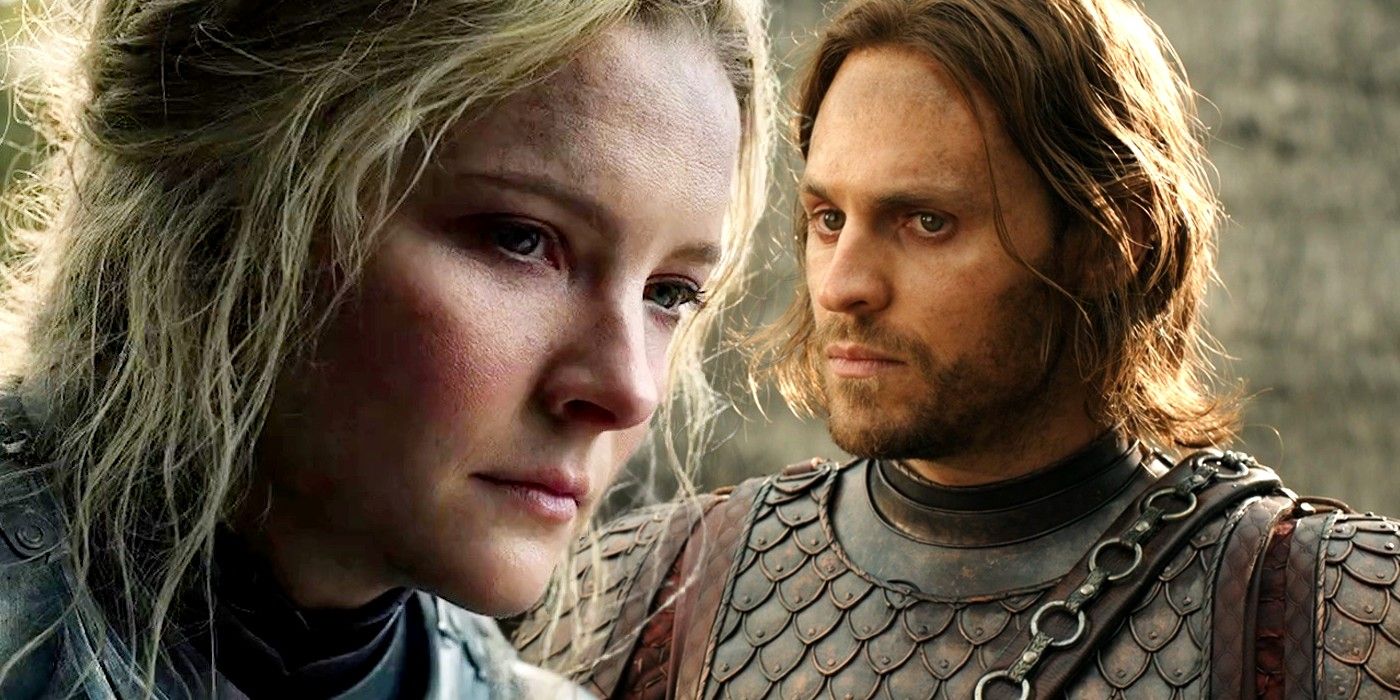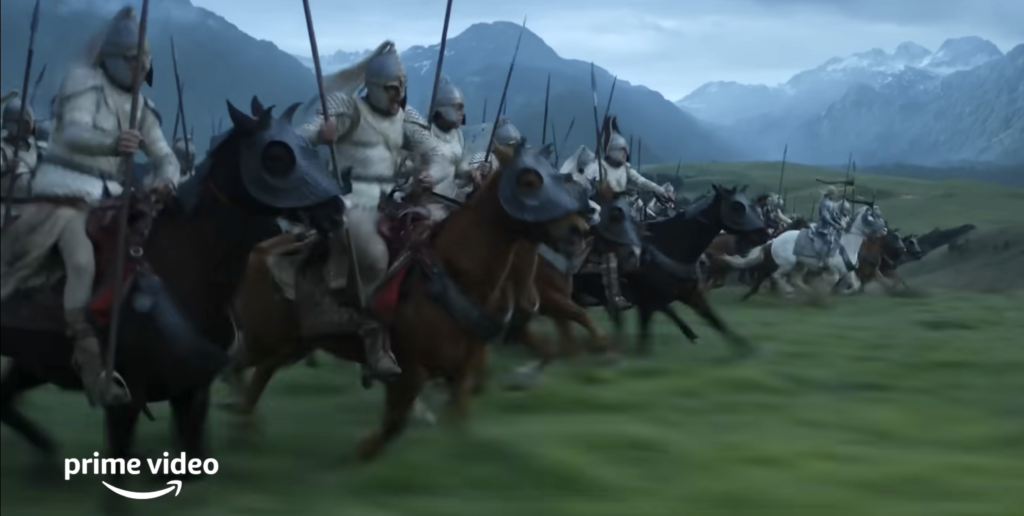. . . . Ep. 6, "Udûn". Moveth now the Second Age's Doom.
Nampat arrives with vengeance in this episode. No dwarves, no Harfoots in this sequence of events, only orcs, Númóreans, other humans, one High Elf, and one Sylvan Elf.
In the Black Speech, the official language of Mordor, nampat means Death. The orces pound out Nampat as their war-chant, marching behind Adar. Soon they arrive at Sauron's Tower of Ostirith, taken over as a watchtower over the Southlands by the sylvan elves after Sauron's defeat in the First Age. Our villagers have taken refuge there from the coming of Adar and his orcs.
Reversal after reversal, twist after twist, come quick and fast. Halbrand, Galadriel and Arondir fight with particular skill and heroism. Yet, yes, it ends with Doom bursting upon the Númenóreans and the Southland humans. To save his mother Bronwyn’s life, Theo gives Sauron's sword hilt- key to Adar. Somehow it gets passed to traitor villager, Waldreg, who activates it. The waters of the earth above ground and subterranean are loosed through those dreadful tunnel excavated underneath the the Southland over a long stretch of time via enslaved human labor. The underground waters meet a molten region under the Southlands, thus a mountain explodes into volcano – Mt. Doom comes to life – flood, fire balls and orcs pour into the village. Galadriel is subsumed into fiery darkness. She was right. Sauron lives. Cue episode 7.
Only two more to go, and I'm very sorry about that.
Just as old school LotR readers will likely be shocked that Galadriel can have what appear to be threshold romantic moments with not just one man, but two – Elendil and Halbrand -- how could this distant ice queen of Lothlórien, married for so long to that dull fellow, Celeborn, behave like this, any more than she does hand-to-hand combat and has a hot temper, which desires to wipe every orc off the face of the earth?
 |
| Elendil |
 |
| Galadriel and Halbrand, King of the Southlands |
LotR lovers equally could have a difficulty accepting that the orcs are elves, actual beings, Adar says, “as worthy as the breath of life and just as worthy of a home.”
It was clear cut in LotR as the Big Bad Dark and all its creatures, were unadulterated evil, and the Big Bright Virtues of the Light, the elves, etc. were unadulterated Good. But here in Rings of Power's Second Age of Middle earth, both Adar and Arondir plant alfirin seeds, which elves traditionally plant on the eve of battle so that new life can grow "in defiance of death". That Adar does this too -- is it a sign that he's potentially redeemable? Or just that he holds onto to a bit of his elven heritage despite all the evil he's committed? Arondir too plants some of the seeds in Bronwyn’s wound to help them heal after they are cauterized. This is imaginatively involving and very different, while still, to my mind, consistent with what Tolkien created.
Hal is recognized as King of the Southlands, but Adar doesn’t recognize him at all, despite their shared past, in which he inflicted some dreadful hurt upon Hal. Adar confirms he one of the elves who are the “sons of the dark,” the first orcs, a Uruk, a Moriandor, made by Morgoth’s torture, and evidently Sauron's too. Adar advises Galadriel that she own her own darkness, that he isn't "the only elf alive who has been transformed by darkness.” Yet, prior to the Doom, Halbrand and Galadriel save each other from their respective urges to commit murder, in an affecting scene. While horse Berek, ridden into battle by Isildur, and his father Elendil bond. Previous to this, Galadriel speaks Words to her horse and it speeds so effectively she catches up with Adar fleeing with the Key.
May Queen Regent Míriel escape the flood and fire emergence of the Dark, but one fears she did not survive, so Pharazôn has his way open to rule Númenor, to institute his ambition to dominate the elves, dwarves and all the rest of Middle Earth.
At this moment the only one of this group of heroes seemingly entirely beyond the effect of the dark, is Arondir. Galadriel and Halbrand are touched by it, as is Theo, who admits how Sauron's sword hilt-key draws him by the sense of personal power he feels when holding it. This is a morally complicated world, with characters who aren’t black and white, which LotR was as well, at least in a sense, as with Boromir and his father. But the LotR's world constantly harks back to the treasons, corruptions and destructions within various characters of the heroes legendarium of the Second Age, that brought about its fall. There's a great deal of viewing satisfaction watching this roll out, despite knowing how it will conclude.
This episode gave me shivers of doom – but then the Second Age is doomed, particularly these very Southlands. Nevertheless, it was satisfying and effective; it moved the plot along swiftly, while we learned quite a bit more about some of our principal characters, including how Elendil's wife died -- drowning. What we see and learn in this episode has been set-up in the previous ones. The episodes are building on and out from each other.
Among the fireballs of bitter bile and malice relentlessly released by Some upon this series are the accusations that the lines spoken by are our heroes are stupid-silly. Patience, Watchers! High Language dialog can -- and probably will -- feel forced and artificial in our own wizened rhetorical age. But read aloud the same efforts in the revered LotR, and if they aren’t among the current elderly who first discovered LotR back when it first became a publishing phenomenon, and they themselves were young, so young, people shudder. So what do we want? Pseudo hipster quippage a la PJ, or occasions in which heroes speak in fabricated, skaldic poetics? Myself, I vote to apply judiciously, "the glorious ground of Endill . . . . "


1 comment:
https://deadline.com/video/deadline-com-video-lord-of-the-rings-the-rings-of-power-episode-6-after-show-spoilers-tolkien/
Again, one of the highlights of this aftershow is the composer talking about what they did in various scenes with a variety of surprising, but authentic instruments. They use actual musicians played composed music; it isn't keyboarded digital special effects. One can hear this difference.
Post a Comment